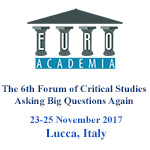Euroacademia Conferences
 Europe Inside-Out: Europe and Europeanness Exposed to Plural Observers (9th Edition) April 24 - 25, 2020
Europe Inside-Out: Europe and Europeanness Exposed to Plural Observers (9th Edition) April 24 - 25, 2020 Identities and Identifications: Politicized Uses of Collective Identities (9th Edition) June 12 - 13, 2020
Identities and Identifications: Politicized Uses of Collective Identities (9th Edition) June 12 - 13, 2020 8th Forum of Critical Studies: Asking Big Questions Again January 24 - 25, 2020
8th Forum of Critical Studies: Asking Big Questions Again January 24 - 25, 2020 Re-Inventing Eastern Europe (7th Edition) December 13 - 14, 2019
Re-Inventing Eastern Europe (7th Edition) December 13 - 14, 2019 The European Union and the Politicization of Europe (8th Edition) October 25 - 26, 2019
The European Union and the Politicization of Europe (8th Edition) October 25 - 26, 2019 Identities and Identifications: Politicized Uses of Collective Identities (8th Edition) June 28 - 29, 2019
Identities and Identifications: Politicized Uses of Collective Identities (8th Edition) June 28 - 29, 2019 The European Union and the Politicization of Europe (7th Edition) January 25 - 26, 2019
The European Union and the Politicization of Europe (7th Edition) January 25 - 26, 2019 7th Forum of Critical Studies: Asking Big Questions Again November 23 - 24, 2018
7th Forum of Critical Studies: Asking Big Questions Again November 23 - 24, 2018 Europe Inside-Out: Europe and Europeanness Exposed to Plural Observers (8th Edition) September 28 - 30, 2018
Europe Inside-Out: Europe and Europeanness Exposed to Plural Observers (8th Edition) September 28 - 30, 2018 Identities and Identifications: Politicized Uses of Collective Identities (7th Edition) June 14 - 15, 2018
Identities and Identifications: Politicized Uses of Collective Identities (7th Edition) June 14 - 15, 2018
Eternal Rebirth: The Difficult Development of Urban Identity Between Destruction, Reconstruction and New Formal Layouts – The Case of Argenta (Ferrara, Italy)
-
-

-
Presentation speakers
- Enrico Pietrogrande, University of Padua, Italy
- Andreina Milan, Department of Architecture, University of Bologna, Italy
Abstract:
More than seven decades after the end of the Second World War and after a decade-long economic crisis, the urban landscape of small and medium-sized cities in Italy faces a difficult economic situation, full of uncertainties and profound changes in the social, economic and cultural framework. The depletion of the countryside, the aging of the resident population and the rarefaction of the new generations (with scarce employment opportunities, mass immigration and migratory phenomena) have led to a fragile situation for the cities of the Po Valley. The purpose of the paper is to draw critical assessments on regeneration and urban development phenomena that have addressed post-war reconstruction in agro-industrial contexts. In this sense, formal and identifying characteristics emerge of a community that boasts settlement continuity dating back millennia. The case study refers to the city of Argenta located in the territory of Ferrara. The particular settlement conditions – alongside the ancient branch of the Po River – define what was once an essential inland navigation node. Argenta was destroyed and rebuilt several times throughout its very long history, thanks to the willful roots of the population: after the destruction from the war in April 1945 the city was rebuilt in a very short time, and it resumed its daily life despite the wounds. A turbulent rebirth only allowed for fragments the re-composition of the settlement and monumental heritage of great value. With its dreary and mediocre architectural style, today the town is nevertheless dotted with examples and buildings of a certain quality: rethinking and reviewing the links, the fragments, the traces of a broken history reveals a possible path for a new vitality in the Third Millennium.
-
Related Presentations

Postcolonial Art and Critical Discourses at the São Paulo Biennial
- Amélia Siegel Corrêa













